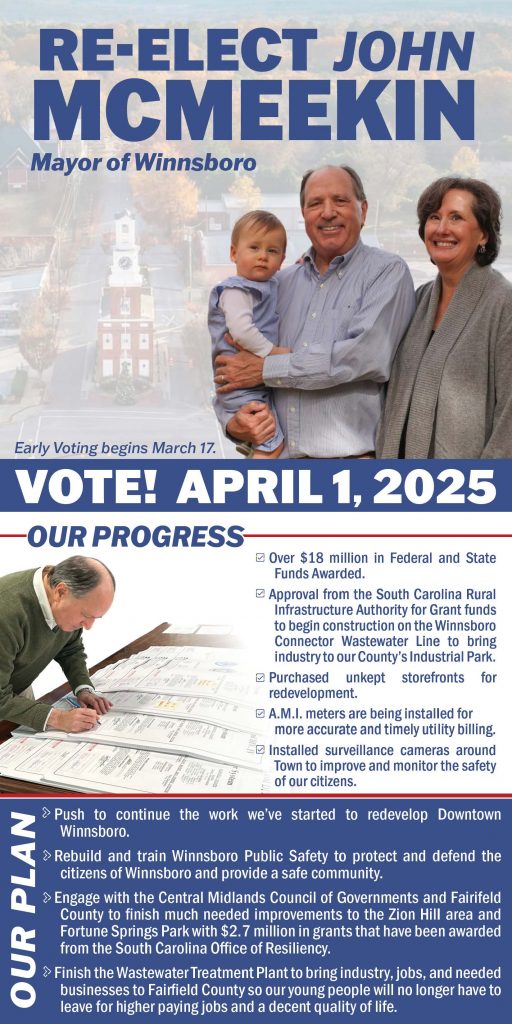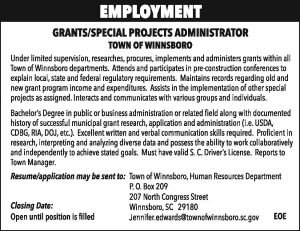WINNSBORO – With minimal discussion, the Fairfield County Council moved forward at this month’s meeting with plans to put a wastewater treatment plant referendum on November’s ballot.
If given final approval next month, the ballot question will ask voters to authorize a one percent sales tax in the county, and the county would issue bonds, if needed, which would be paid back with revenue generated by the tax. The money would be earmarked for capital projects, specifically the wastewater treatment plant and other needed wastewater infrastructure.
“Once you get to a certain point as far as capacity with sewer, the South Carolina Department of Health and Environmental Control (DHEC) does step in. They put you in a moratorium situation, which means basically you can issue no more building permits; you can’t issue anymore connections to the sewer plant,” explained County Administrator Jason Taylor.
“You do get in a position where you can’t accept any additional growth, and DHEC will shut you down,” he said.
“The county is not in that position yet, but it only has 32,000 gallons of available wastewater capacity remaining for industrial development,” Taylor said. “Due to small sized lines, that is all that is available for the commerce park or mega site, which is not nearly enough. One company could take all of that.”
While Winnsboro does have roughly 100,000 gpd of capacity available in town, adding more capacity for the county has come to the forefront as a priority.
The anticipated revenue from the tax, which will expire after eight years, is $11.5 million – a bit more than the $9.35 million that would be authorized for a bond issue.
The meeting, which was held in person but with several participants calling in by phone or video, began with a public hearing, in which the one comment that had been received was read by Clerk to Council Patti Davis. The comment, from District 1 resident Randy Bright, was in favor of the proposal.
“Building water and wastewater infrastructure in rural and urban communities creates jobs, stimulates the private sector, and increases a community’s tax base,” Bright wrote, citing a Duke University study. “For each dollar spent building water or wastewater infrastructure, about $15 is created in private investment and $14 added to the local property tax base.”
Most of the county council’s discussion was centered around questions clarifying the details of the proposal, including some hypothetical what-if scenarios and the reasoning behind why the proposal is structured the way it is.
Attorney C.D. Rhodes, who is assisting Fairfield county with the referendum, said in response to council members’ questions that if something were to change, enabling the project to be funded by other means, the revenue from the one percent sales tax would still be earmarked for capital projects.
Council would then have to initiate another referendum for voters to approve its use for specific projects. To designate projects without a referendum would require waiting until the end of the tax’s eight-year term.
Rhodes also explained the likely need for a bond issue: Unlike counties that use a tax of this type to fund a list of projects, which can be done on a pay-as-you-go basis, Fairfield County doesn’t have the luxury of waiting eight years to build the wastewater treatment plant; the urgency of the project means that ideally it should be built in two or three years.
“You would have, at the very least, a year’s worth of tax collections to prove to yourself and the public and everyone else – and banks, honestly – to prove that those collections were going to come in as expected,” Rhodes said of the situation prior to any bond issue.
“If we get a year into this thing, and for instance the Covid situation hasn’t improved, then it may make lots of sense for you to wait until you’re two years out and you have two years of tax collections and you increase your level of certainty,” he said.
“The good news is that, as you wait, those taxes keep coming in and they keep getting deposited into your bank, and so the amount of the bonds that you have to borrow keeps going down and down and down, and you have cash on hand that you can use for the plant whenever the time is right to build it.”
While a couple of the council members expressed distaste for the idea of borrowing money, the majority supported the project as a whole, and the council voted 5-2 to approve offering the referendum, which would allow the voters to decide.
Chairman Neil Robinson, Vice Chair Bertha Goins, and council Members Clarence Gilbert, Jimmy Ray Douglas, and Doug Pauley voted in favor. Council Members Moses Bell and Mikel Trapp were opposed.
Vice Chairman Bertha Goins said it’s important to get information about the project and the referendum out to the voters, and she urged her fellow council members to share information in their districts.
“We need to… get an understanding to the citizens of the value of this one percent sales tax and what they’re going to reap long-term,” Goins said.
“If we do this and we do it right and we’re successful with it, by the grace of God, once the wastewater treatment plant is in place, the lines are in place, [and] we begin to get an influx of businesses and people, we won’t have to worry about bonds, we won’t have to worry about levying taxes or any of that, we’ll just be growing what we’ve already invested in.”












